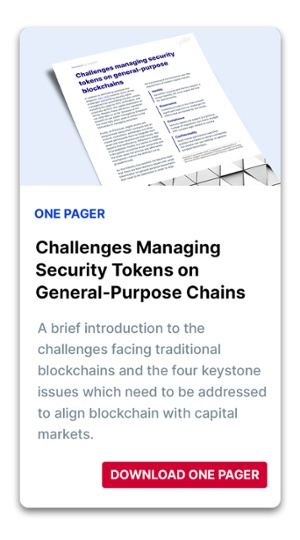Polymath: About a year and a half ago, Gartner said blockchain technology is early in the "trough of disillusionment." In your opinion, how has the industry advanced since then?
Ultan Miller (Ultan): You have to be careful because some parts of the industry move faster than others. After 10 years it appears that people in the mainstream seem to finally get Bitcoin, which is a huge milestone. However, people now have to get their heads around what Ethereum means, and more broadly, what blockchain really means—but we’re starting to see some slow progress.
Crypto has picked up, but a lot of the blockchain enterprise products and services are not yet picking up quite as much. So there’s definitely some work that needs to happen there. We’re slowly getting to the stage where there is common understanding about what a blockchain-based system can offer. I think we’ll eventually see other blockchains gain traction like we’ve seen with Bitcoin.
Polymath: What are some of the challenges that come with being in this stage of the blockchain hype curve?
Ultan: I think of the biggest challenges as opportunities. The challenges have historically been about gaining acceptance, building awareness and changing people's behaviours, and in that lies opportunity. There have been difficult moments, especially in the trough of the bear market. Now we’re moving into a new phase of acceptance, and I believe the challenge is going to be creating a lexicon or common set of terms to facilitate the growth in business knowledge around tokenization and what blockchain can do for businesses. People very quickly caught onto the store of value and digital gold narrative of Bitcoin, and we need similar, easy to digest phrases to take security tokens to that next stage of acceptance and widespread use.
The challenges have historically been about gaining acceptance, building awareness and changing people's behaviours, and in that lies opportunity.
Polymath: How do you envision blockchain technology fitting into the entrenched VC-based raise process?
Ultan: We've grappled with this for a long time, and the challenge for people issuing a security token is that VCs tend to not care about improvements in liquidity since they’re aiming to hold the investment for seven to 10 years. Conversely, the crypto funds we’ve approached about STOs have said, “we don't necessarily want to invest in securities, we like to invest in unregulated digital assets.” So it's been difficult for blockchain to play a role in conventional equity rounds because there's not yet an investor audience that has a clear mandate for this.
For that to change, we need to see new funds being created with objectives that are mindful of the opportunities in tokenization and blockchain. If you look at the success that crypto funds investing in unregulated digital assets have had, they've been able to generate VC-style returns and have then had public market liquidity. Crypto funds are able to place many more bets than a VC, and I think if we can introduce something similar around digital securities it’ll be possible for investors to make more bets given that there’s a clearer path to liquidity. The hybrid hedge fund/VC strategy that many crypto funds deploy is one we could see new funds using with proper liquidity around digital securities.
At the moment it's still a bit of a chicken and egg scenario, because you want to have good quality deals and liquidity to attract investors, but STOs have struggled to offer this so far because those investors aren't really there. I do see that we’re slowly building awareness and what's exciting for me about being involved is helping to create those conditions. We can educate VCs and investors about the new possibilities and hopefully create this new market where blockchain plays a much greater role.
Polymath: Based on your conversations with people in the space, who do you see pushing for increased acceptance and usage of security tokens?
Ultan: As an entrepreneur myself I'm perhaps biased, but I do think this will be founder-led. Startups will want to do things this way because they can save costs for their business. They can potentially unlock opportunities they otherwise wouldn't have been able to, and founders could be the driving force to initially create that groundswell of digital securities opportunities. It's been mostly entrepreneurs coming to us and saying, ‘I want to do a round and we believe digital securities are the future and want to do an issuance in this way’.
The other angle that might draw money into digital securities is the remarkable success of crowdfunding platforms, which really demonstrates that retail investors would like to get earlier access into private companies that have previously been exclusively available to VCs. I believe digital securities will enable more of that.
A lot of the building blocks have been put in place, but we need a couple of landmark deals to create a blueprint for other founders and investors to follow.
Polymath: When it comes to security tokens, what needs to happen for the market to move forward to the next stage of growth?
Ultan: There are quite rational and logical things that need to happen, like infrastructure that needs to be built and processes that need to be implemented. A lot of the building blocks have been put in place, but more than anything, we need a couple of landmark deals to create a blueprint for other founders and investors to follow.
If we can achieve that over the next six to 12 months, there may be lots of people trying to chase that and it could bring in a lot of activity. I'm very impressed with a lot of the different infrastructure that has been developed. Those trend-setting deals are the missing piece of the puzzle.

